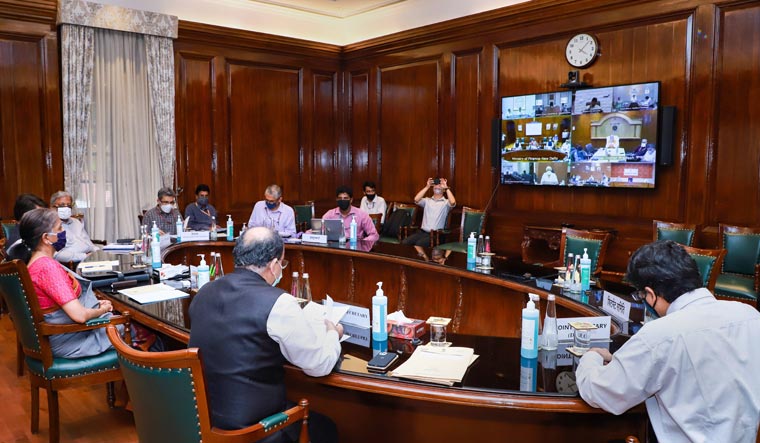The GST Council’s third attempt to resolve the impasse over pending dues to states also ended without a resolution on Monday night. It now seems clear that a division is on the cards, with BJP states going in for borrowing as dictated by the central government, and opposition-ruled states mulling further options, not excluding going to the courts.
“There is no unanimity…but if there are states who want to go ahead and borrow, we will facilitate them,” Finance Minister Nirmala Sitharaman said, throwing the gates open for a chaotic free-for-all.
The single-point agenda of Monday’s GST Council meeting, held between the council chairperson (Sitharaman) and the state finance ministers over video conferencing, was to decide on the issue of compensation cess. Last week’s meeting had gone into more than eight hours without a resolution, with both sides digging in and refusing to cave in.
The vexing GST compensation issue stems from a total of Rs 3 lakh crore that has to be paid to the states as per the terms of the original GST revenue sharing agreement from when the Council was formed. While this year’s cess collection is expected to bring in Rs 65,000 crore, the question of finding funds for the remaining 2.35 lakh crore ballooned into a contentious issue between the centre and states, especially the opposition-ruled ones.
At the GST meeting in August, the finance ministry had proposed two options: Option one was that the estimated shortfall due to GST implementation, Rs 97,000 crore, be borrowed by the states (this amount was later hiked to 1.1 lakh crore at last week’s GST meet) through a special window facilitated by the Reserve Bank. The second option was for the states to borrow the entire Rs 2.35 lakh crore shortfall from the market.
With the pandemic having reduced the tax that could be mopped up, the Centre said it was the best it could do, and promised it could be paid back by continuing to levy cess for more number of years. However, many states, especially Chhattisgarh and Kerala, cried foul, saying it was the centre’s responsibility to pay up the money due to them, and that it should do the borrowing itself and give to the states as per agreement.
The only decision where there was an agreement was to continue with the cess beyond 2022.
“There was no consensus,” admitted Sitharaman after the meeting. However, voting was not an option the Council went for, though Sitharaman did say that the “majority of the states had opted for Option 1.” She explained later that it was important than a consensus be reached, as all states have to be on the same page while going for a mode of raising the money to meet the deficit.
Battle lines were drawn much more distinctly at the Council this time, with states ruled by BJP or its allies, as many as 21 of them, coming out very clearly in support of the Centre, while those ruled by opposition parties were adamant about not accepting either of the options suggested by Sitharaman. While BJP states like Goa and Assam came out saying they want to opt for the first option, those like Chattisgarh and Tamil Nadu supported the line of thinking voiced by Kerala, West Bengal and Punjab. Punjab and Tamil Nadu argued that it has to be the centre that has to do the borrowing.
Constituting a Group of Ministers (GoM) was an idea mooted as the third option, after the October 5 meeting went on for hours without a consensus on either of the two options to borrow offered by the Centre. The option of taking the matter to parliament, or to a dispute resolution mechanism, was also shot down by the Centre, leaving the likes of Kerala to come up with a GoM to thresh out the issue. Punjab Finance Minister Manpreet Singh threw the gauntlet at Sitharaman and her team on Monday night, saying that if a GoM was constituted today, it could be asked to submit its report within 48 hours.
Today’s GST meeting was keenly watched as the row over compensation cess was not just about revenue loss, but something that could have a bearing on future centre-state relations. This is because when the GST Council was formed a few years ago, states were wary about giving up their areas of financial autonomy to the centre. A consensus finally came about after laborious discussions. States agreed to give up their tax powers (except in the areas of fuel and alcohol) in the interest of unifying and standardising the domestic indirect tax regime into the same across the whole country.
“That was a great example of co-operative federalism,” notes M. Govinda Rao, member, 14th Finance Commission in a column in Livemint, writing, “The creation of a GST Council provided a model and could be a harbinger for many future co-operative institutions.”
However, that model itself is the one at risk of crumbling due to the diffident stance taken in recent meetings. In fact, except once earlier this year, there has never been any voting in the GST Council—all decisions were taken amicably and unanimously. That now seems to be a thing of the past.






